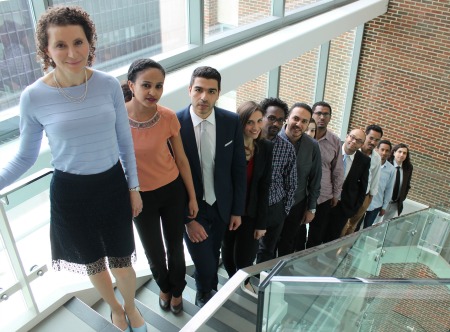(Edmonton) For Aminah Robinson Fayek, a University of Alberta professor in construction engineering and management and the NSERC Industrial Research Chair in Strategic Construction Modeling and Delivery, teaching is synonymous with engaging and empowering. Her outstanding achievements as an educator have been recognized through this year's prestigious APEGA Excellence in Education Award.
With 20 years of experience in education, mentoring, and student supervision, Robinson Fayek is a firm believer in the value of face-to-face interaction with students in the classroom, and serving as a role model for young women in engineering.
Robinson Fayek didn't envision a career in engineering.
"I never set out to become an engineer," she says. "In fact, I was quite interested in the arts, in fine arts, but I always loved math." Her math skills eventually led to a Bachelor's degree in engineering from McGill
University, a Master's degree in construction engineering and management from the University of British Columbia, and a PhD in construction engineering and management from the University of Melbourne. As her career in the profession was evolving, teaching became an integral part of the job and a lifelong passion.
"I really enjoy engaging with students at the graduate and undergraduate levels. I find that the students at the University of Alberta are very talented, and they have a diverse range of experience."
Today, she is an educator in a broad sense of the term: classroom instruction, graduate student supervision, creative teamwork, and student mentorship are just some of the aspects of teaching she excels at.
Besides being a full-time academic with the Department of Civil and Environmental Engineering, Robinson Fayek has been involved as an educator with a number of organisations. One of them is the Edmonton Science and Technology Hotline. She has visited elementary school classes to encourage an interest in engineering among young students. The teaching objectives here are different from the ones outlined in university syllabi: instead of intricate theories and their applications, students build bridges with spaghetti and get a feel for construction work.
Robinson Fayek worked with WISEST: Women in Scholarship, Engineering, Science and Technology, a University of Alberta unit fostering diversity in engineering, science, and technology. She has also participated in group and panel discussions with female high school students and represented the Faculty of Engineering on the WISEST student liaison committee.
Robinson Fayek believes in increasing female student representation in the profession by showing that being an engineer goes far beyond traditional engineering work. "There is a stereotype, a very narrow definition of engineering that does not always appear to recognize the interests of women or the diversity of skills that they can offer," says Robinson Fayek. "As a result, many female students do not end up pursuing an education in engineering."
To break down the stereotypes, Robinson Fayek strives to get the right message across, to educate young students about engineering and to get them excited about what the profession is really about.
"Career opportunities in engineering go far beyond how we traditionally think of the field."
For Robinson Fayek, being an educator entails delivering material precisely and clearly and tailoring her teaching style and methods to suit the group. What's most important is maintaining a two-way interaction: "When I look at teaching, I see it as engaging with the students."
The biggest challenge in the classroom is keeping up with technology, she says.
"When I started teaching, we were using blackboards-it was even before whiteboards-blackboards and overhead projectors. I've adjusted now, and most of my material is accessible online. I try as much as I can to integrate the use of multimedia in my instruction and assignments," says Robinson Fayek.
Still, her approach incorporates some of the traditional best practices. The classroom experiences she treasures most are student discussions and live interaction that occurs at formal lectures.
"Yes, you can get the notes online, you can also get the assignments, and so on, but you can't replace the personal face-to-face classroom experience because each interaction produces new insights. Every year I might teach similar material, but I'm interacting with a different group of students who bring their own ideas to the table. Bringing my research into the classroom also enriches the discussions and enhances the student experience," she says.
This is the second year in a row a U of A engineering professor has won the prestigious teaching award. For Robinson Fayek, it is an honour and recognition not only of the work she has done, but also of work yet to be done.
"I feel like I'm on a journey, and this award only serves as further motivation to continue to expand my knowledge and methods as an educator. I feel very honoured and fortunate to receive this award and to be recognized for something I love to do."

Aminah Robinson, seen here with her graduate students,
is the recipient of the 2016 APEGA Excellence in Education Award.